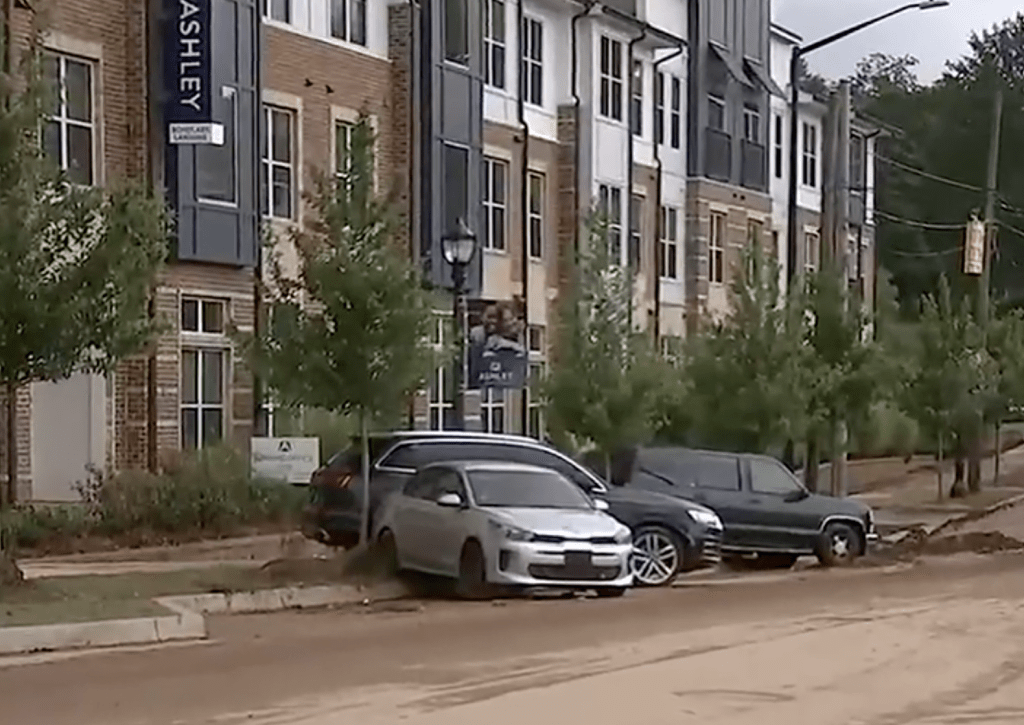
On the afternoon of Sept. 14, the unimaginable happened. The Georgia Aquarium on Baker Street in downtown Atlanta had to be evacuated because of too much water — not from leaky fish tanks, but from flash flooding that seeped into the facility. Less than a mile away, a rain gauge near the office of the city’s watershed management department registered 1.34 inches of rain in fifteen minutes: an amount “usually observed in three hours,” according to Mikita Browning, the department’s commissioner.
The isolated thunderstorm ultimately dumped nearly three inches of rain, providing a particularly graphic example of what can happen when the natural landscape is transformed by urbanization into roads, rooftops, and other hard surfaces. The deluge slammed into pavement and rooftops before speeding downslope, pushing aside much in its way.
Parked cars floated down streets. Moving cars had to be abandoned when their engines flooded. Dorms at Clark Atlanta University were evacuated as dirty stormwater entered buildings and rushed down hallways. First responders rescued people from water that was five feet deep in some areas. The U.S. Geological Survey stream gauge nearest to the urban core — located on Proctor Creek in the Grove Park neighborhood — recorded an astonishingly rapid rise in water level from three feet to twelve and a half feet in less than an hour, followed by an equally rapid fall.
Heavier rainfall
Like many places around the planet, Atlanta is experiencing its own consequences of a hotter world: the increase in intensity and frequency of extreme weather events. As storms travel across warmer oceans, they absorb more water vapor and heat leading to heavier rainfall, stronger winds, and more flooding. This past summer, oceans registered the highest temperatures in modern history.
Wet, stormy weather is not unusual in the South, as those of us who grew up here can attest; the 1960s was a particularly rainy decade. Nor is flooding in low-lying areas — such as Atlanta’s Vine City, Peoplestown, and Mechanicsville — unexpected. What is new are intense, flashy rainfall events over short periods of time. Municipal stormwater systems were not designed to handle these extreme events, which are more frequent due to climate change.
Tackling stormwater
In 2002, then-mayor Shirley Franklin created the Clean Water Atlanta Program: a response to the federal consent decree that settled the lawsuit filed by Chattahoochee Riverkeeper and others in the mid-1990s to stop chronic overflows of untreated sewage and polluted stormwater into streams and rivers. The long-term goal of the program has been to meet the requirements of clean water laws and align the city’s wet weather strategies with sustainable solutions.
Mayor Franklin asked Wayne Clough, then-president of Georgia Tech, to convene an advisory panel of national experts to focus on technical aspects of the city’s plan to fix its combined sewer and stormwater system. Pipes built nearly a century ago to serve downtown Atlanta conveyed sewage and stormwater — together — to facilities for treatment; however, by the 1990s, overflows were occurring sixty times per year on average. Downtown development, new pavement, and aging infrastructure combined to stress the system, resulting in increased flooding and pollution.
Among other solutions, the Clough panel endorsed the construction of deep-rock tunnels in some areas to capture and detain storm runoff prior to treatment. According to Mikita Browning, these storage tunnels and several green (natural) infrastructure projects helped minimize flooding impacts during the recent flash flood event. Over the years, the watershed department has taken additional steps to slow and capture stormwater to reduce flooding and pollution. The city also passed a nation-leading post-development stormwater ordinance in 2013 requiring developers to manage the first inch of stormwater that falls on their sites.
These initiatives have been supported by a portion of the municipal option sales tax (MOST) first passed by the state legislature nearly twenty years ago to help fund the mandated multi-billion-dollar overhaul of the city’s sewage system. To grapple with the extreme weather events associated with global heating and safeguard lives and property, a more robust budget is needed.
A game-changing strategy
The Clough panel’s report, delivered to Mayor Franklin in late 2002, recommended a five-point plan. It included a critical strategy to reduce stormwater pollution and flooding: a stormwater utility. Adopted by dozens of municipalities in Georgia, a stormwater utility can provide a steady and reliable source of revenue for reducing stormwater flooding and pollution with green and gray (engineered) infrastructure. Proposed several times over the past twenty years, Atlanta’s city council has not — yet — been able to muster the political will to implement a utility. Meanwhile, the storms keep coming.
In a press release issued after the recent downtown flash flooding event, Browning noted that her department is “evaluating the feasibility and approach for a stormwater utility while considering affordability.” She told me a utility would be a “game-changer” for managing extreme weather events throughout Atlanta; she hopes to bring the utility proposal forward by next spring. This fall, she plans to introduce a measure that would require developers in the downtown area to store (and later release) more runoff than previously required to reduce peak storm volumes and rates.
A stormwater utility can ensure that everyone pays their fair share for their contributions to the flow of runoff from their developed (hardened) property into the community and nearby waterways. It’s past time for the city of Atlanta to embrace this practical, proven strategy. Let Mayor Andre Dickens and the Atlanta City Council know that you are behind their efforts to make our city more resilient and protect people, property, and the environment with a stormwater utility.
